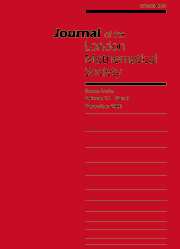Crossref Citations
This article has been cited by the following publications. This list is generated based on data provided by
Crossref.
HOLT, DEREK F.
and
RÖVER, CLAAS E.
2006.
GROUPS WITH INDEXED CO-WORD PROBLEM.
International Journal of Algebra and Computation,
Vol. 16,
Issue. 05,
p.
985.
Lehnert, J.
and
Schweitzer, P.
2007.
The co-word problem for the Higman-Thompson group is context-free.
Bulletin of the London Mathematical Society,
Vol. 39,
Issue. 2,
p.
235.
Kambites, Mark
Silva, Pedro V.
and
Steinberg, Benjamin
2007.
On the rational subset problem for groups.
Journal of Algebra,
Vol. 309,
Issue. 2,
p.
622.
Kambites, Mark
2008.
The loop problem for Rees matrix semigroups.
Semigroup Forum,
Vol. 76,
Issue. 2,
p.
204.
ELDER, MURRAY
KAMBITES, MARK
and
OSTHEIMER, GRETCHEN
2008.
ON GROUPS AND COUNTER AUTOMATA.
International Journal of Algebra and Computation,
Vol. 18,
Issue. 08,
p.
1345.
Lohrey, Markus
and
Steinberg, Benjamin
2008.
The submonoid and rational subset membership problems for graph groups.
Journal of Algebra,
Vol. 320,
Issue. 2,
p.
728.
HOLT, DEREK F.
OWENS, MATTHEW D.
and
THOMAS, RICHARD M.
2008.
GROUPS AND SEMIGROUPS WITH A ONE-COUNTER WORD PROBLEM.
Journal of the Australian Mathematical Society,
Vol. 85,
Issue. 2,
p.
197.
Meer, Klaus
and
Ziegler, Martin
2009.
Real Computational Universality: The Word Problem for a Class of Groups with Infinite Presentation.
Foundations of Computational Mathematics,
Vol. 9,
Issue. 5,
p.
599.
GILBERT, N. D.
and
NOONAN HEALE, R.
2011.
THE IDEMPOTENT PROBLEM FOR AN INVERSE MONOID.
International Journal of Algebra and Computation,
Vol. 21,
Issue. 07,
p.
1179.
Hoffmann, Michael
Holt, Derek F.
Owens, Matthew D.
and
Thomas, Richard M.
2012.
Developments in Language Theory.
Vol. 7410,
Issue. ,
p.
97.
Ceccherini-Silberstein, Tullio
and
Woess, Wolfgang
2012.
Context-free pairs of groups I: Context-free pairs and graphs.
European Journal of Combinatorics,
Vol. 33,
Issue. 7,
p.
1449.
Bleak, Collin
and
Salazar-Díaz, Olga
2013.
Free products in R. Thompson’s group 𝑉.
Transactions of the American Mathematical Society,
Vol. 365,
Issue. 11,
p.
5967.
Brough, Tara
and
Holt, Derek F.
2013.
Finitely Generated Soluble Groups and Their Subgroups.
Communications in Algebra,
Vol. 41,
Issue. 5,
p.
1790.
DIEKERT, VOLKER
and
WEIß, ARMIN
2013.
CONTEXT-FREE GROUPS AND THEIR STRUCTURE TREES.
International Journal of Algebra and Computation,
Vol. 23,
Issue. 03,
p.
611.
Elder, Murray
and
Taback, Jennifer
2014.
C-graph automatic groups.
Journal of Algebra,
Vol. 413,
Issue. ,
p.
289.
Rino Nesin, Gabriela Aslı
and
Thomas, Richard M.
2015.
Descriptional Complexity of Formal Systems.
Vol. 9118,
Issue. ,
p.
243.
Kambites, Mark
2015.
Anisimov's Theorem for inverse semigroups.
International Journal of Algebra and Computation,
Vol. 25,
Issue. 01n02,
p.
41.
Ceccherini-Silberstein, Tullio
Coornaert, Michel
Fiorenzi, Francesca
Schupp, Paul E.
and
Touikan, Nicholas W.M.
2015.
Multipass automata and group word problems.
Theoretical Computer Science,
Vol. 600,
Issue. ,
p.
19.
Henry, Christopher S.
2016.
The (nested) word problem.
Information Processing Letters,
Vol. 116,
Issue. 11,
p.
729.
Bennett, Daniel
and
Bleak, Collin
2016.
A dynamical definition of f.g. virtually free groups.
International Journal of Algebra and Computation,
Vol. 26,
Issue. 01,
p.
105.


